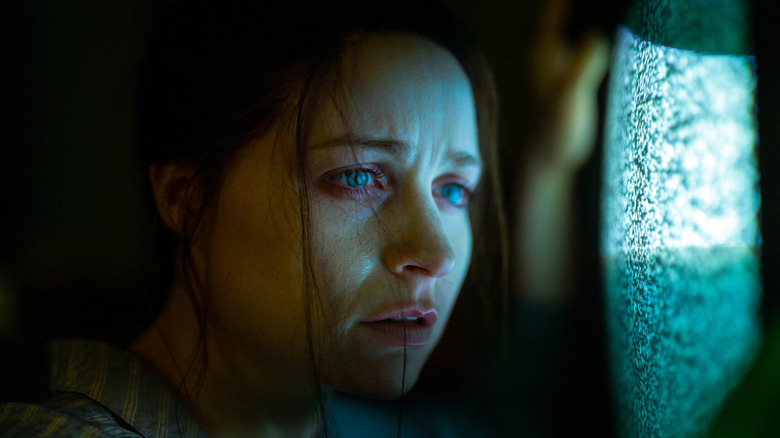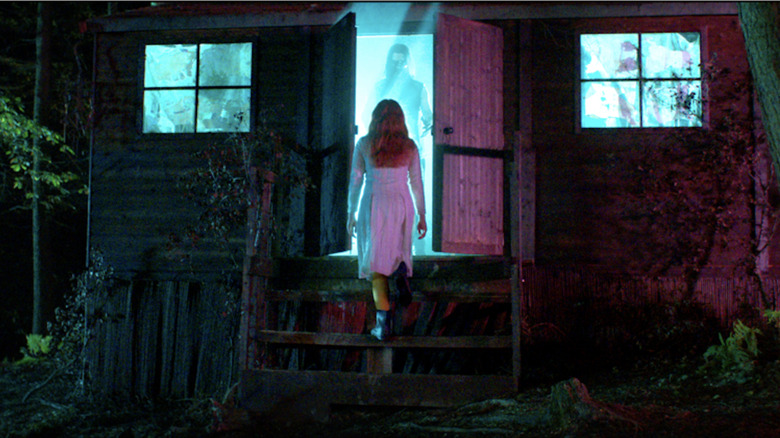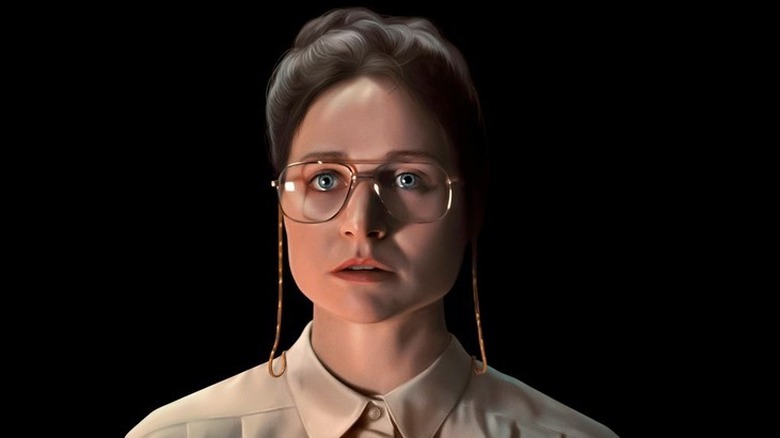Censor Review: A Nasty Piece Of Work
A deeply unsettling, slow-burning horror flick propelled by an impressive turn from star Niamh Algar, "Censor" channels the murky, blood-splattered mystique of low-budget '80s slashers to tell a David Lynch-like tale with a brainy question at its core: Who truly controls the art, its creator, or the person who can mute its message?
Set in the heart of the VHS age, the movie depicts a UK film censor whose job is to screen the so-called "video nasties" that incited a real-life media circus in the early '80s. Day after day, week after week, buttoned-up Enid (Algar, from "Raised by Wolves") meticulously studies these depraved films through eyeglasses that hang around her neck by a sensible string. Out of everyone in the office, she is most the most strict; when asked if she's seen any good movies lately, she coolly replies: "It's not entertainment. I do it to protect people."
But as we learn, Enid is not protecting her own psyche. She lives alone, exists in a nondescript, grey reality, and is haunted by a singular event. As a young girl, her seven-year-old sister Nina headed off into the woods with her — but Nina never came out. Enid is convinced that her sister was kidnapped, that it's just a matter of time before she resurfaces. When her parents present her with a death certificate, finally ready to put the tragic past behind them, it only amplifies her desire to "save" her sister.
All the while, Enid's day job subjects her to vicious assaults, gruesome murders, and seemingly endless footage of torn-out intestines, bloody beheadings and victimized women letting out primal screams of terror. One film, entitled "Don't Go in the Church," becomes the bridge between the nightmares she's paid to watch every day and the nightmare she chooses to suppress. Directed by a reclusive, enigmatic filmmaker named Frederick North, it involves an axe, a structure in the woods, and a horrifying man who puts out a strong "Killer Bob"-meets-Andre the Giant vibe.
In some ways, discussing "Censor" necessitates the exploration of two different films: The first two relatively straightforward, tension-building acts, and then an off-the-rails final third. It is an impressive showcase for Niamh Algar, who is not only in every scene of the movie but undergoes a mind-blowing transformation from mouse to menace over its 84-minute runtime. She begins the film as a buttoned-up prude and ends it as a groveling, delirious, self-deluded avenger drenched in blood (both real and movie-fake), all in a series of sequences that strip away her tenuous grip on reality in ways that would make Davids Cronenberg and Lynch proud.
The plot of "Censor" boils as the so-called "Amnesiac Killer" becomes a headline-grabbing specter in the press; after seeing a horror film Enid approved called "Deranged," which features a scene where the killer eats his victim's face, this guy ... well, killed someone and ate their face. This puts her on the hot seat, especially as her name leaks to the press and Enid begins receiving disturbing phone calls from an angry public. Things boil over as Enid becomes convinced that the work of North (and his sleazy producer Doug Smart, played by Michael Smiley) is sending signals that they orchestrated Nina's kidnapping and/or turned her into an imperiled actress billed as "Alice Lee," who is about to film her final scene — and all that implies.
House party from hell
Employing the trappings of '80s VHS slashers to great effect, director Prano Bailey-Bond clearly knows the genre. One particularly memorable visual gimmick involves laying the "static" so often found on old tapes (remember when we had to adjust the tracking?) over what we're watching, giving brief glimpses of unsettling horror amidst the "happiness" being presented. Bailey-Bond also uses aspect ratio to her advantage, giving the film a claustrophobic sense that its world is closing in on Enid as she makes her journey toward the truth.
But whose truth is it? Enid so firmly believes the narrative that her sister was kidnapped and remains alive that the film's final act has her twisting the depraved realities of the films she watches, convinced that messages abound in them and the only way to fight terror is with terror. North (the filmmaker played with captivating manipulation by Adrian Schiller) wants to terrify his scream queens, take them to the most awful place they have inside, and then turn on the camera. By the end of "Censor," a fascinating reversal has taken place: Enid the censor is pushing things to be bloodier, gorier and more "real," while the filmmaker is left appalled by what he's witnessing.
Unfortunately, it's this third act — almost all of which feels more free association than scripted — that will lose most people. Almost all the aforementioned plot points are thrown out the window (the "Amnesiac Killer" gets a half-hearted dismissal when a throwaway line mentions he never even saw the movie that had supposedly inspired him), any attempt at explaining character motivations is tossed off like a bulky sweater on a warm day, and the film is content to just get primal. Whether that's earned — well, that's a judgement call each viewer needs to make on their own.
But other matters are more difficult to dispute: When Enid finally confronts North, it may be one of the most tense scenes of the year, with the director pointing his camera and a blinding light at her and maliciously barking: "Come on, commit! Take control of your story!" Similarly, Enid's moment with the lecherous producer Smart is magnificently orchestrated — and a key evolution for Enid, whose detached manner serves her well ("Thank you for the whiskey. I'll see myself out") as the blood begins to flow.
Making the cut
"Censor" is the sort of film that folds in on itself in a good way, having revealed multiple layers that demand repeat viewings. Will it give you what you're looking for in a slasher film? Perhaps, but don't be surprised if you feel unusually guilty laughing at a man impaled by his own trophy. The film walks a fine line between mocking the "satanic panic"-like atmosphere that permeated '80 controversies like the "nasties" and Tipper Gore's PMRC, and depicting the blurring lines of a confused mind subjected to such violent acts ad nauseam.
Prano Bailey-Bond wears her influences on her sleeve, and has studied them well. There are most certainly huge debts owed to "Videodrome," "Mulholland Drive," and Brian De Palma's "Blow Out," as well as lesser-known flicks like Paul Schrader's "Hardcore" and Joel Schumacher's "8MM." There are also, of course, numerous allusions to the "video nasties" that once invaded England in clamshell boxes, bearing "be kind, rewind" stickers — films like "I Spit on Your Grave," "Faces of Death," "A Bay of Blood," and "Gestapo's Last Orgy," some of which also gained infamy in the US, and others which are only remembered today as creatively titled punchlines in extremity. But rather than being excerpted, Bailey-Bond chooses to recreate the gouged eyeballs and gored entrails.
Both Prano Bailey-Bond (making her feature film debut) and Niamh Algar (in her most high-profile film role to date) show tremendous poise, impact, and potential. There is no genre more difficult to pull off than truly unsettling psychological horror, and there are transcendent moments in "Censor" where both really get into a groove.
The best compliment you can pay a movie is to say it's unforgettable, and "Censor" is undoubtedly that. This is no "The Sentinel," or "Knight and Day," "Tammy," or "The Change-Up," something you'll see on HBO Max in a few months and wonder: Have I seen that already? Instead, "Censor" gets under your skin and into your head, resurfacing in unexpected moments after the credits roll and you try to make sense of it. Like a twisted dream, does it have some deeper meaning? Or should you just appreciate the spell it cast?
Either way, "Censor" is a highly recommended descent into hell.


